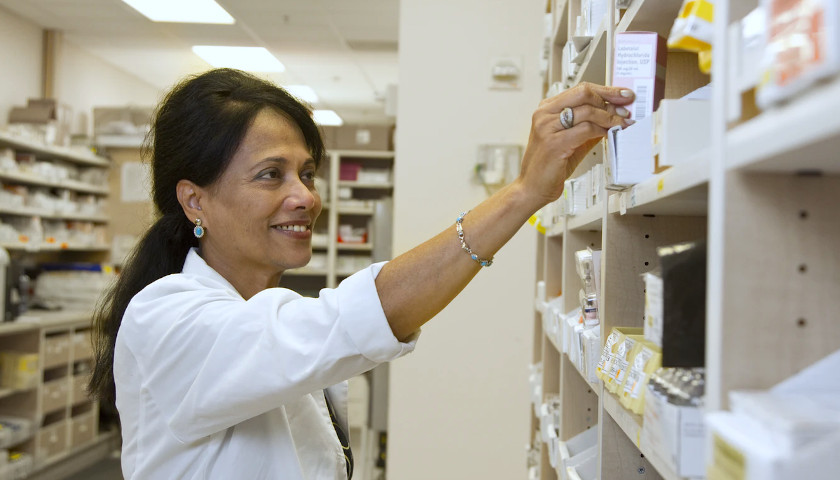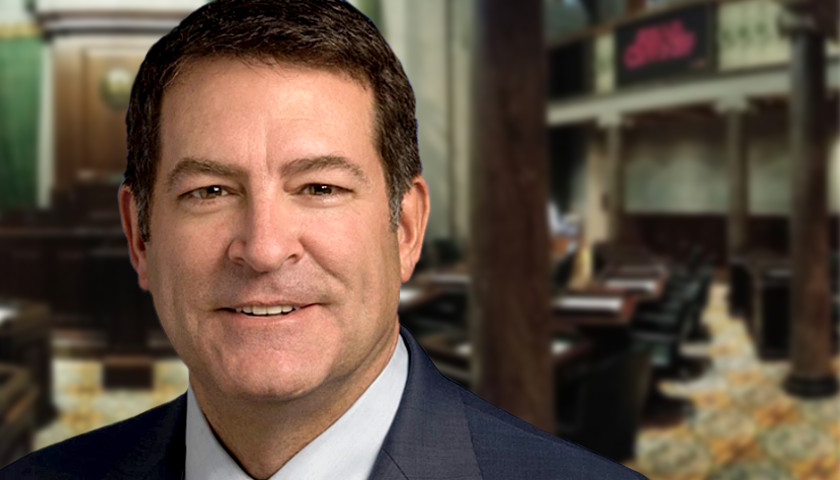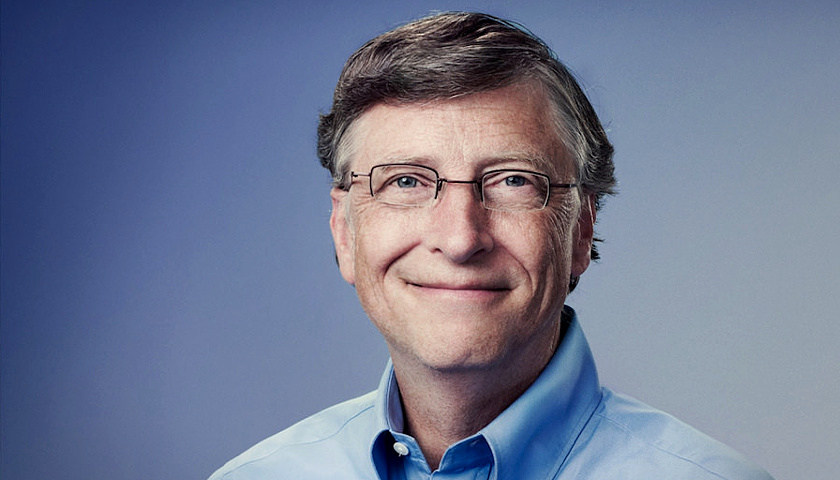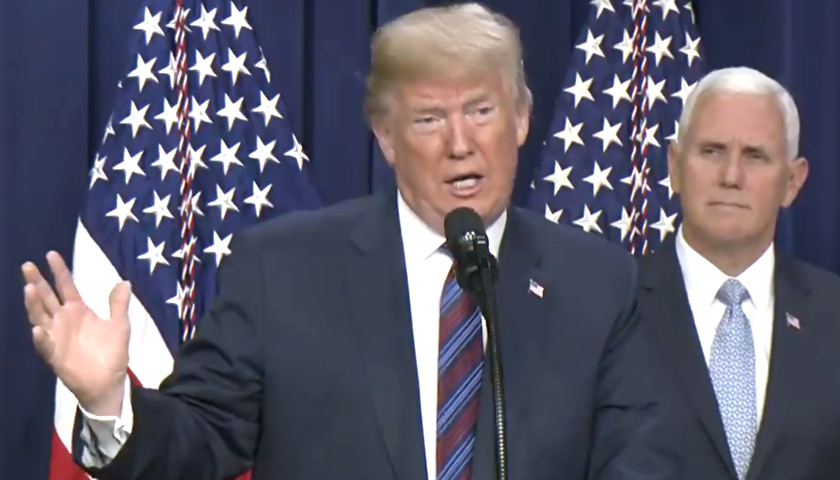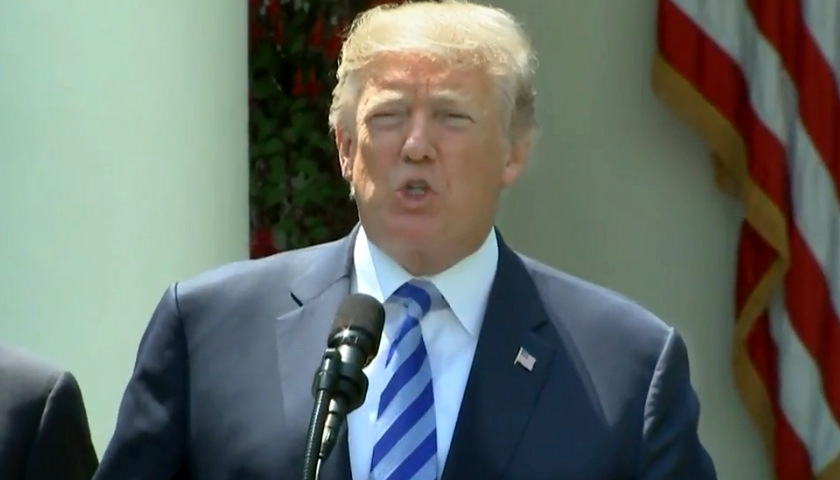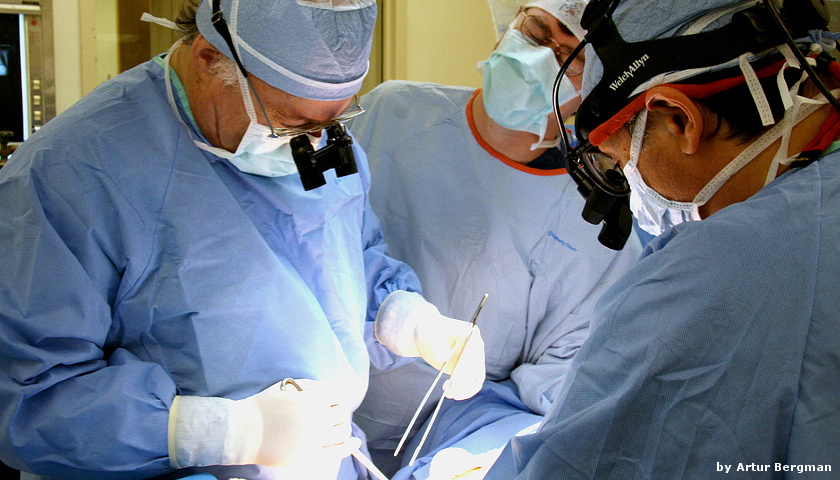Michigan pharmacies are now able to dispense emergency refills of prescriptions, Gov. Gretchen Whitmer announced on Wednesday.
Read the full storyTag: medicine
REPORT: Google Is Working On Secret Project To Collect Personal Health Data On Millions Of Americans
Google is reportedly partnering with the second-largest health care system in the U.S. in an effort to collect health data on millions of Americans, according to people familiar with the matter.
Read the full storySTUDY: ‘Medicare for All’ Will Further Lower Physician Morale
Last week, the administrator of the Center for Medicare and Medicaid Services, Seema Verma, spoke at The Heritage Foundation on the effect “Medicare for All” would have on American health care.
Read the full storyBreast Cancer Drug Shows Promise, Boosts Survival Rates by 30 Percent
A new form of drug drastically improves survival rates of pre-menopausal women with the most common type of breast cancer, researchers said on Saturday, citing the results of an international clinical trial. The findings, presented at the annual meeting of the American Society of Clinical Oncology in Chicago, showed that the addition of cell-cycle inhibitor ribociclib increased survival rates to 70 percent after 3½ years. The mortality rate was 29 percent less than when patients were randomly assigned a placebo. Lead author Sara Hurvitz told told AFP the study focused on hormone receptor-positive breast cancer, which accounts for two-thirds of all breast cancer cases among younger women and is generally treated by therapies that block estrogen production. “You actually can get synergy, or a better response, better cancer kill, by adding one of these cell-cycle inhibitors” on top of the hormone suppression, Hurvitz said. The drug works by inhibiting the activity of cancer-cell promoting enzymes known as cyclin-dependent 4/6 kinases. The treatment is less toxic than traditional chemotherapy because it more selectively targets cancerous cells, blocking their ability to multiply. An estimated 268,000 new cases of breast cancer are expected to be diagnosed in women in the U.S. in…
Read the full storyOhio Department of Health Confirms Investigation of Doctor Who Prescribed Lethal Opioid Doses to 27 Patients
In most major surgeries, a doctor will prescribe, at most, 20 micrograms of fentanyl, a powerful opioid pain killer. At most, as an “adjunct to general anesthesia,” 20-50 micrograms are used. Doctor William Husel of Columbus was administering, in some cases, 1,000 micrograms. After prescribing these lethal doses to at least 27 patients, justice may finally be coming for him. The Ohio Department of Department of Health confirmed Friday that it was launching an investigation into the shocking revelations regarding Dr. Husel. The investigation came after a Monday report that the critical care physician had prescribed these unprecedented doses of fentanyl to 27 patients. The earliest death, as discovered, appears to have taken place in March 2015. Jan Thomas, a near-death patient, was prescribed 800 micrograms of the opioid. Thirty-one minutes after the lethal prescription was administered, she was declared dead. As of reporting, the doctor faces at least four lawsuits, representing more than a dozen of the affected families. While the prescribing doctor is at fault in every one of these instances, the nature in which the deaths occurred raises additional and serious questions. Whenever a doctor requests a large amount of a controlled substance, like fentanyl, there is an extensive process of approval that…
Read the full storyOhio State Board Considers Approving More Conditions for Marijuana Treatment
With medicinal marijuana sales imminent in the Buckeye state, the Ohio State Medical Board is currently considering a slew of additional medical conditions for medicinal marijuana treatment. Currently, 21 conditions are approved for the controversial treatment. A number of the conditions cover a wide swathe of ailments. For example, cancer is an approved condition but it does not specify which of the more than 100 known forms of cancer that occur in humans are covered and which aren’t, so, presumably, all of them could be. It would ultimately be at the mercy of the prescribing doctor, though any doctor found overprescribing could be fined, lose their medical license, and even face jail time. Per Ohio Administrative Code 4731-32-05, every year the state is required to give citizens the opportunity to submit petitions for new conditions to be approved for marijuana treatment. Thus far, the Ohio State Medical Board has received 110 petitions. Forty-four of these documents were asking treaments that are already included in the Code. Fifty-four did not meet the final requirements or number of signatures but may be resubmitted. Among the new conditions being considered are anxiety, depression, and insomnia. Per a recent medical study, there is very little research on the…
Read the full storyAntisemitic Doctor Who Said She’d Give Jews the Wrong Medication No Longer Employed at Ohio Hospital
by Joshua Gill An Ohio hospital confirmed Monday that it no longer employs a doctor who made anti-Semitic comments and promised to give Jewish patients the wrong medication. The Cleveland Clinic said in its statement that it became aware of the social media posts by Lara Kollab, 27, who worked at the clinic from July to September 2018, and that her beliefs conflicted with those of the clinic. The hospital did not state, however, whether Kollab had been let go as a direct result of her tweets. Kollab had a history of making violently anti-Semitic comments on social media. An online compilation of Kollab’s tweets showed she often referred to Jews as “dogs,” invoked Allah to kill them, and denigrated both Israel and the U.S. “Cleveland Clinic was recently made aware of comments posted to social media by a former employee,” the hospital’s Monday statement reads. “This individual was employed as a supervised resident at our hospital from July to September 2018. She is no longer working at Cleveland Clinic. In no way do these beliefs reflect those of our organization. We fully embrace diversity, inclusion and a culture of safety and respect across our entire health system,” the…
Read the full storyDr. Carol M. Swain Commentary: Congress’s Role in Creating America’s Healthcare Crisis
by Dr. Carol M. Swain In 2017, President-elect Donald Trump sent pharmaceutical stocks into a nosedive by speaking an important truth. Drug companies, he said, are “getting away with murder” with their pricing of lifesaving drugs. True to his word, the president, since his election, has pushed for needed reforms aimed at lowering the costs of prescription drugs. On this matter, the president and socialist Sen. Bernie Sanders (I-VT) agree: Americans are paying too much for drugs, medical supplies, and equipment. The president and Sanders would like to see U.S. prices aligned with other nations’ lower prices. I recently attended a meeting in Washington of health care professionals, where the attendees were mostly physicians and other citizens, including pastors and health care workers, concerned about the high cost of drugs and the effect that drug shortages have on their patients and congregants. The meeting was racially and politically diverse. Of great concern was the life-threatening situations people are placed in when making decisions about whether to purchase their medicine or pay the rent or house note. As informed as I am on many issues, this was an area of ignorance for me. I had never heard of legalized drug kickbacks and relationships between hospitals, facilities,…
Read the full storyDr. Carol M. Swan Commentary: Congress’s Role in Creating America’s Healthcare Crisis
by Dr. Carol M. Swain In 2017, President-elect Donald Trump sent pharmaceutical stocks into a nosedive by speaking an important truth. Drug companies, he said, are “getting away with murder” with their pricing of lifesaving drugs. True to his word, the president, since his election, has pushed for needed reforms aimed at lowering the costs of prescription drugs. On this matter, the president and socialist Sen. Bernie Sanders (I-VT) agree: Americans are paying too much for drugs, medical supplies, and equipment. The president and Sanders would like to see U.S. prices aligned with other nations’ lower prices. I recently attended a meeting in Washington of health care professionals, where the attendees were mostly physicians and other citizens, including pastors and health care workers, concerned about the high cost of drugs and the effect that drug shortages have on their patients and congregants. The meeting was racially and politically diverse. Of great concern was the life-threatening situations people are placed in when making decisions about whether to purchase their medicine or pay the rent or house note. As informed as I am on many issues, this was an area of ignorance for me. I had never heard of legalized drug kickbacks and relationships between hospitals, facilities,…
Read the full storySHOCK: Medical Students’ Surgical Abilities Declining Rapidly in a Growing Digital Age
by Annie Holmquist Whether it’s for something as serious as cancer or as routine as a kidney stone, no one likes to hear that they have to go under the surgical knife. But such unhappy news is often lightened once a patient has the chance to talk to the surgeon and realize that he is in good, capable hands. Unfortunately, those good, capable, surgery-performing hands may be an increasing rarity in the years ahead. According to Roger Kneebone, a London professor of surgical education, the last several years have seen a decided change in the abilities of medical students: they are having greater difficulty working with their hands. As Kneebone explains to The Guardian, this decline is directly related to the decline of hobbies and school activities which force children to work with their hands: People are no longer getting the same exposure to making and doing [things] when they are at home, when they are school, as they used to. Kneebone goes on to imply that skills learned in shop class, home economics, or other more extra-curricular courses have been thrown out of school with unforeseen consequences: We are talking about the ability to do things with your hands, with tools, cutting…
Read the full storyDr. Mark Green Commentary: Liability Reform a Major Area for Healthcare Savings
by State Senator Dr. Mark Green (R-Clarksville) In my third and final op-ed on the healthcare crisis facing America, I’ll discuss the last major problem causing the crisis as well as a solution to address it. You can read part one here, and part two here. Liability reform is a major area for saving billions of dollars. No one wants to be sued, causing doctors to go crazy ordering CAT scans and labs to make certain that if we are called to the witness stand, we can say we did everything we could. Frivolous lawsuits and exorbitant awards are costing providers and their insurance companies millions of dollars in insurance premiums. Those costs are then passed onto the patients in increased healthcare costs, and thus, increased insurance premiums. In some states, like Florida, three lawsuits and you lose your license. In a recent poll of emergency physicians, 65% said that they could save over $500 per 8-hour shift by decreasing unnecessary tests as a part of their defensive practice. Another 16% felt they could save between $200 and $500 dollars. I ran a level 2 trauma center that saw 75,000 patients a year. If we assume a conservative savings…
Read the full storyState Medical Board Has A Simple Solution To Help Amid Physician Mental Health Crisis
by Evie Fordham The Washington State Medical Commission (WMC) is taking a step to combat the high suicide rate among physicians by making physician licensing questions more friendly to doctors who have sought psychiatric help. Updates to Washington state’s licensure questions will focus on an individual’s current impairment rather than if a doctor has had mental health problems at any point in the past. Many doctors fear their reputations and even licensure are at risk if they seek help from a psychiatrist for feelings of burnout or even suicidal thoughts. Currently, many doctors are “having to sneak out of town, pay cash and use a fake name” when seeking help from a mental health professional, family physician Pamela Wible told Kaiser Health News. She is a self-proclaimed “voice for ideal medical care” and has gathered more than 1,000 stories of doctor suicides for her website to help people better understand the issue. The WMC expects to update the questions in December after the changes were voted on in June, WMC Executive Director Micah Matthews told The Daily Caller News Foundation via email. “Historically, medical license applications asked if the applicant has ever had any medical conditions or substance abuse that may impair their practice,” Matthews…
Read the full storyBill Gates Backs $30 Million Push for Early Alzheimer’s Diagnostics
Reuters Billionaire Bill Gates and Estée Lauder Cos chairman emeritus Leonard Lauder on Tuesday said they will award $30 million over three years to encourage development of new tests for early detection of Alzheimer’s disease. For Microsoft co-founder Gates, launch of the Diagnostics Accelerator program follows an announcement in November of a personal investment of $50 million in the Dementia Discovery Fund, a venture capital fund aimed at bringing together industry and government to seek treatments for the brain-wasting disease. The effort, Gates said, was fueled in part by his personal experience with family members struggling with Alzheimer’s. The most common form of dementia, Alzheimer’s affects nearly 50 million people worldwide and is expected to rise to more than 131 million by 2050, according to Alzheimer’s Disease International. Gates and Lauder provided seed money for the diagnostics collaboration through the Alzheimer’s Drug Discovery Foundation (ADDF), which was founded by Lauder. They will be joined by other philanthropists, including the Dolby family and the Charles and Helen Schwab Foundation. Funding provided through the initiative will be open to scientists and clinicians globally working in academic settings, charities and biotechnology companies. As a philanthropy vehicle, the ADDF Diagnostics Accelerator venture will invest in riskier…
Read the full storyPromise Kept: President Trump’s Landmark ‘Right to Try’ Legislation Curbs Government’s Monopoly on Medicine for Terminally Ill Patients
In a signing ceremony on Wednesday, President Trump fulfilled another campaign promise by signing legislation nicknamed “Right to Try” that will expand seriously ill patients’ access to experimental treatments that could extent or even save their lives. Mr. Trump called the measure a “fundamental freedom” for people with terminal conditions to use medicines that have not yet completed the approval process of the Food and Drug Administration, but nonetheless show promise in their initial testing. “With the ‘Right to Try’ Law I am signing today, patients with life-threatening illnesses will finally have access to experimental treatments that could improve or even cure their conditions,” President Trump said. The bill was passed by the House of Representatives last week largely along party lines, with Republicans backing the measure – saying it could give hope to people looking to save their own lives – while Democrats opposed the the bill, citing such a law would engender ‘false hope.’ Similar laws have been passed in all but ten states with broad support by both parties – an uncomfortable fact many Democrats will have to explain as they return home for the campaign season. As Marc Thiessen wrote in the Washington Post Wednesday, “In the states, Right to…
Read the full storyTrump Is Following Through On His Pledge To Lower Drug Prices, Here’s The Plan
by Steve Birr The Trump administration released its blueprint for lowering skyrocketing prescription drug prices Friday, a strategy that has already saved patients nearly $9 billion. President Donald Trump, along with Health and Human Services Secretary Alex Azar, outlined their four-pronged approach to making medications more affordable during an afternoon press conference. Their approach includes: expanding access to generic drugs of more expensive brand names, sweeping Medicare reforms that allow better price negotiation, removing incentives for high list prices and drastically reducing the out-of-pocket expenses of America’s seniors. “President Trump and his Administration are already delivering on the promise to lower drug prices for American patients,” Deputy Press Secretary Hogan Gidley told The Daily Caller News Foundation. “In the past year we have been very successful increasing competition and curbing high drug prices and are pleased to report that FDA’s 2017 generic drug approvals in 2017 saved prescription drug buyers in America nearly $9 billion.” The U.S. Food and Drug Administration set a record in 2017 for approving the most generic drugs in the history of the regulatory agency. A sharp increase in drug approvals coupled with new FDA guidance that helps companies complete the generic drug approval process faster led to $8.8 billion…
Read the full storyPresident Trump Faces Institutional Obstacles to Overcome U.S. Drug Pricing Fiasco
President Trump is scheduled to deliver his first speech Friday to introduce an overarching plan to confront high drug prices. As a candidate, where he railed against the pharmaceutical industry and accused it of “getting away with murder.” The populist rhetoric appears to be giving way to a more nuanced strategy focused on making the pharmaceutical market more open and competitive, with the aim of lowering costs for consumers. It’s an approach that could avoid a direct confrontation with the powerful pharmaceutical lobby, but it could also underwhelm Americans seeking relief from escalating prescription costs. Administration officials previewing the speech Thursday touted it as the most comprehensive plan to tackle prescription drug costs that any president has ever proposed, but offered few specifics. Officials said the plan would increase competition, create incentives for drugmakers to lower initial prices and slash federal rules that make it harder for private insurers to negotiate lower prices. The result would be lower pharmacy costs for patients — a key Trump campaign promise. The plan will not include giving the federal Medicare program power to directly negotiate prices with drugmakers, they noted. Trump campaigned on the idea, which is vigorously opposed by the pharmaceutical industry. Public outrage…
Read the full storyCommentary: The Deadly Incompetence of the FDA
by Dan Mitchell I routinely grouse about the heavy economic cost of red tape. I’ve also highlighted agencies (such as the EEOC) that seem especially prone to senseless regulations. And I’ve explained why private regulation actually is a very effective way of promoting health and safety. Today, let’s get specific and look at the Food and Drug Administration. This bureaucracy ostensibly is supposed to protect us by making sure drugs and medical devices are safe and effective before getting approval, which seems like it might be a reasonable role for government. But the FDA routinely does really foolish things that undermine public health. The likely reason is that the bureaucracy has a bad incentive structure. As Professor Alex Tabarrok has explained. …the FDA has an incentive to delay the introduction of new drugs because approving a bad drug (Type I error) has more severe consequences for the FDA than does failing to approve a good drug (Type II error). In the former case at least some victims are identifiable and the New York Times writes stories about them and how they died because the FDA failed. In the latter case, when the FDA fails to approve a good drug, people die but the bodies are buried in an invisible…
Read the full storyThree Ways Regulation Makes Health Care Expensive
by David Youngberg Saying that America’s health care system is terrible isn’t anything you haven’t heard before. We spend more than any other developed country on health care and get less for it. In fact, many insured Americans don’t get anything at all. But because U.S. health care is not provided by a government monopoly, observers erroneously conclude that health insurance must be a purely capitalistic system and blame capitalism for the high costs and low benefits. But American health care is more cartel than competition. It would serve the public’s interest to turn our attention to the corporatism and protectionism that constrain patient choice and inflate health care costs. I’ve provided you with three areas we can easily change the status quo. End CONs—Certificates of Need Take a moment to imagine that opening a restaurant required you to demonstrate that your community “needs” another place to eat. Now, imagine in such a situation that, if regulators grant you permission, current restaurants—your future competitors—could challenge and ultimately block you from opening your restaurant. As crazy as this sounds, this is how the health care industry works in the USA. It’s called a Certificate of Need, and one is required whenever someone wants to build or…
Read the full storyRemoving One Enzyme Could Be Key To Curing Alzheimer’s
An experimental treatment completely reversed Alzheimer’s disease in mice by reducing the levels of a single enzyme in the animals’ brains. The results further bolster the theory that amyloid plaques are at the root of this mysterious brain disease, and that addressing these plaques could lead to an eventual cure for Alzheimer’s.
Read the full storyAmerica’s Opioid Crisis Has Doctors Warning Nashville Patients, ‘You Will Feel Pain’
Nashville Public Radio reports Tennessee’s medical community is in the midst of a major turnaround in the way they treat patients’ pain in response to the opioid addiction crisis gripping the nation: The big hospital chains based in Nashville are accepting some of the blame for the country’s opioid crisis, which grows more deadly by the year. They admit they were going overboard with opioids to make people as pain-free as possible. So in an effort to be part of the cure, they’re issuing an uncomfortable warning to patients — you’re going to feel some pain. Even for those who’ve never struggled with drug abuse, studies are finding that patients are at risk of addiction anytime they go under the knife. In short, one of the most common gateways to addiction is medical treatment, itself. NPR reporter Blake Farmer shares the all-too-common story of Las Vegas mom and paramedic Michelle Leavy, a healthy mother who underwent a c-section and was prescribed opioids to manage the post-surgical pain: [Leavy] welcomed the high-dose intravenous narcotics while she was in the hospital. And as she went home, she gladly followed doctors’ orders and kept ahead of the pain with her Percocet pills. But then she needed…
Read the full storyStudy: Weight Loss Can Cure Type 2 Diabetes
Type 2 diabetes can be reversed with weight loss, according to new findings by researchers in the U.K., challenging conventional wisdom that the acquired disorder requires lifelong management. Almost half of the 306 participants recruited went into remission, which varied with the amount of weight loss, but the highest rates of remission being achieved in the group that lost the most weight.
Read the full story
